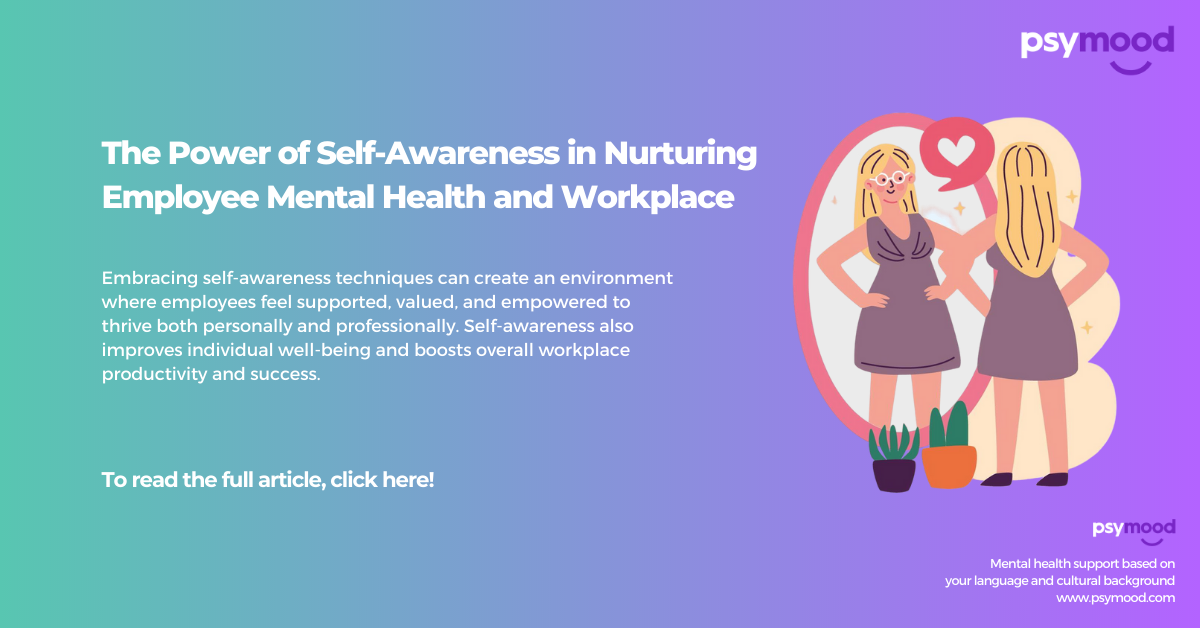The Power of Self-Awareness in Nurturing Employee Mental Health and Workplace
In the ever-evolving landscape of today’s fast-paced corporate world, the recognition of employee well-being as a linchpin to a productive and motivated workforce has become imperative. As organizations endeavour to create thriving work environments, the pivotal role of self-awareness in nurturing mental health and fostering positivity cannot be understated. This topic embarks on a journey to explore the transformative power of self-awareness in the workplace, unravelling its profound impact on employee mental well-being and organizational success.
With August designated as National Wellness Month, there is no better time to embrace the significance of self-awareness in promoting holistic well-being. By incorporating self-awareness practices, organizations can empower their workforce with the tools to understand and manage their emotions, build resilience, and establish meaningful connections within the workplace. As we celebrate National Wellness Month, let us embark on a collective effort to prioritize self-awareness, foster a positive work culture, and elevate the overall health and prosperity of our workforce. Together, let us pave the way to a brighter and more harmonious future for all.
Enhancing Self-Awareness for Stress Management
Self-awareness is a cornerstone of stress management. By encouraging employees to recognize their emotions, triggers, and stressors, organizations can empower them with the tools to respond effectively. Techniques such as mindfulness and meditation help employees develop greater emotional intelligence and better coping strategies. Regular self-reflection and journaling provide an avenue for processing emotions, reducing stress, and gaining insights into one’s thought patterns. Stress-reduction workshops and seminars offer practical tips and exercises to combat stress and anxiety effectively. Cultivating Mental Clarity: Meditation Techniques for Improved Focus and Memory at Work
Additionally, offering flexible work arrangements allows employees to strike a better work-life balance, reducing overall stress levels.
Building Resilience and Emotional Intelligence
Resilience and emotional intelligence are vital attributes in navigating the challenges of the modern workplace. Organizations can facilitate emotional intelligence training programs to equip employees with empathetic listening skills, better-understanding emotions, and manage interpersonal relationships. Encouraging a culture of seeking feedback and learning from setbacks fosters resilience and personal growth. Providing resources for self-help and personal development aids in building emotional intelligence and equipping employees to handle emotional challenges with grace. Team-building exercises, such as trust-building activities, enhance emotional bonds within teams, enabling them to support one another during tough times.
Balancing Work-Life Integration through Self-Awareness
The pursuit of work-life integration is critical to avoid burnout and maintain long-term employee well-being. Organizations can educate employees on the importance of balance and encourage time management and prioritization skills. By implementing policies that support flexible working hours and remote work options, employees can better manage personal responsibilities while meeting work commitments. Encouraging employees to unplug from work during non-working hours allows for rejuvenation and prevents work-related stress from seeping into personal life. Furthermore, offering wellness programs, such as fitness classes or mental health support resources, reinforces the organization’s commitment to employee health.
Cultivating Self-Aware Leadership for Positive Organizational Culture
Leadership plays a pivotal role in shaping workplace culture. Cultivating self-aware leaders who lead by example and demonstrate vulnerability fosters a positive and supportive work environment. Leadership development programs on self-awareness can help leaders understand their strengths and areas for growth, enabling them to improve their leadership style. Creating a culture of psychological safety encourages open dialogue and sharing of ideas without fear of judgment, leading to greater transparency and trust within the organization. Recognizing and rewarding empathetic leadership behaviours motivates leaders to continue fostering an inclusive and supportive work atmosphere. Mentorship programs further enhance leadership self-awareness, as mentors can provide valuable feedback and guidance in a safe space.
By embracing self-awareness techniques within each subtopic, organizations can create an environment where employees feel supported, valued, and empowered to thrive both personally and professionally. The integration of self-awareness not only improves individual well-being but also boosts overall workplace productivity and success.
Share your insights in the comments section below on the mindfulness and productivity challenges businesses face concerning self-awareness in the workplace. At PsyMood, we specialize in providing tailored solutions for businesses and institutions, offering comprehensive support to enhance the mental well-being of entrepreneurs, employees, and business owners. To learn more about our services, reach out to us at partnerships@psymood.com.
Our extensive offerings also cater to remote employees, with personalized online or in-person therapy sessions tailored to individual needs, cultural backgrounds, geographical locations, and personal interests. Benefit from therapy sessions that cater to your unique requirements.
PsyMood is your digital ally, ensuring you find the support you need in the language that makes you feel most comfortable. Taking into account various factors such as cultural background, geographical location, and personal needs, we match you with service providers for online or in-person therapy sessions that align with your preferences. Embrace a journey of self-awareness and well-being with PsyMood today.
PsyMood is a digital tool designed to help you find the support you need in the language that you are most comfortable with. PsyMood considers cultural background, geographical location, interests, and personal needs, amongst other factors, to pair you with service providers for either online or in-person therapy sessions.
For More Interesting Posts
You may also be interested in learning more about Healthy Workplace Boundaries: Self-Care Techniques for Positive Relationships with Co-workers and Superiors, Reducing Stress at your Desk: Zen Office Workspace, and The Power of Employee Wellness Programs: Boosting Engagement and Happiness.


.png)
.png)
.png)
Recent Comments